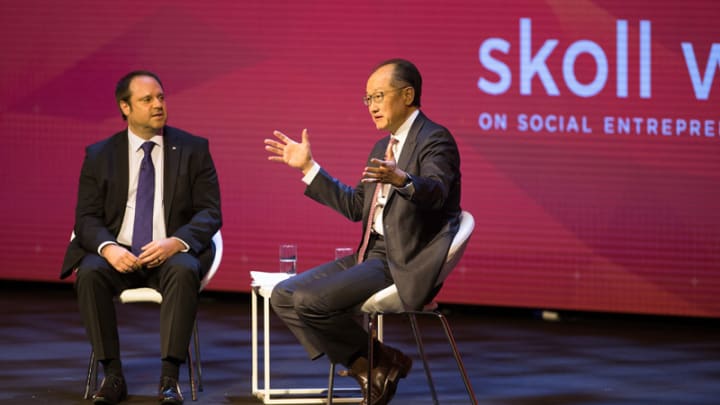
“We are really not ready” for another pandemic outbreak on the scale of the 2014 Ebola crisis, World Bank President Jim Kim has said, adding that international support for the bank’s new pandemic financing facility has collapsed to just two donors.
Speaking yesterday at the opening session of the Skoll World Forum in Oxford, U.K., Kim said that “what happens every time” in the face of pandemics is a cycle of “panic, neglect, panic, neglect.”
While the World Bank has established a Pandemic Emergency Financing Facility since the Ebola outbreak, which is backed by insurers and will ensure that funds can be dispersed quickly in response to future outbreaks, the international community has fallen back into a “lull” and remains ill-prepared, he said, describing the situation as “scary.”
“The system is not there yet,” said Kim, who is also a co-founder of Partners in Health, and a former director of the HIV/AIDS department at the World Health Organization. “We don’t have a system of making new vaccines, we don’t have a surveillance system that works in all the countries in the world … We are still far short of it.”
He said that the World Bank’s new financing facility, due to launch in May, is “one small part” of the solution, but that most international donors have backed away from supporting it.
“When I first talked about it we had 15 donors … At the end, we only have two … Only the Japanese and the Germans could remember this was an issue at some point, and this happens every time,” he said.
The World Bank made $200 million of emergency funding available in record time at the beginning of the Ebola outbreak in 2014. Kim said he was able to convince the bank’s board to do this in just nine days, an unusual move since the bank does not usually respond to short-term crises. The bilateral funder ultimately contributed $1.6 billion toward the Ebola response and recovery operation, he said.
In May 2016, Kim announced a longer term plan to prevent future pandemics, as reported by Devex, and launched the PEF. This $500 million financing mechanism is designed to quickly mobilize funds to tackle global outbreaks of disease and create a new insurance market for pandemic risk.
In his speech at the Skoll World Forum, Kim said that the World Bank needs to play a role as an “honest broker” for the global capitalist system, helping to make it work for the poor.
“We are now trying to change everything we do to be the facilitator, to make sure that the capital — and we will attach knowledge to that capital — can move to developing countries to create these win-win situations. If we don’t, we are in a lot of trouble,” he said.
He also talked about a positive trend of growing aspiration among people in developing countries, but said this could become a negative force unless rapid progress is made in development.
“One of the things we’ve seen, and it’s great to see, is that aspirations are converging in the world. Unless we move more quickly in fighting poverty and creating jobs, thwarted aspirations could turn to something negative,” said Kim.
“Aspirations linked to opportunity yield dynamism; aspirations linked to frustration lead to conflict, violence, extremism, all the things we worry about,” he added. “I feel a huge sense of urgency to make this system work.”
The annual Skoll World Forum — led by the Skoll Foundation and held at the University of Oxford — opened yesterday and runs until the end of the week. It brings together more than 1,000 leaders in social entrepreneurship and development.
Read more international development news online, and subscribe to The Development Newswire to receive the latest from the world’s leading donors and decision-makers — emailed to you free every business day.

